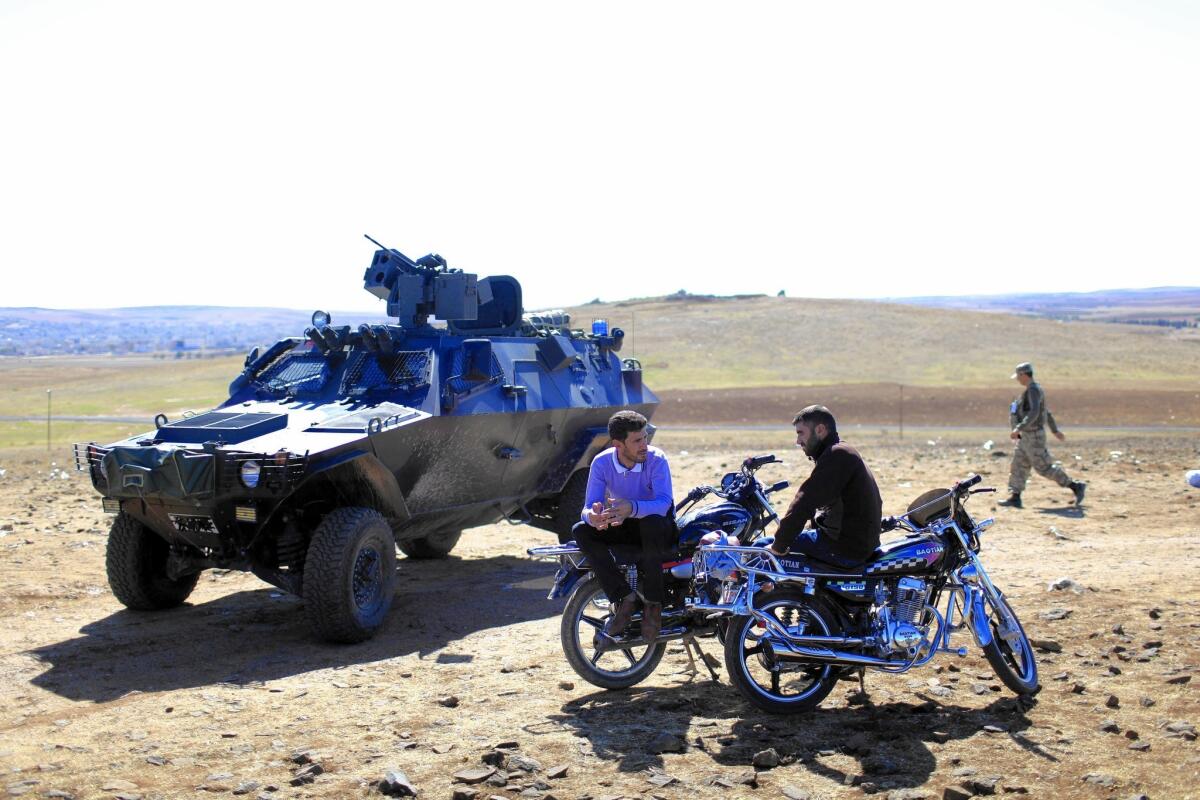Kurdish exiles of Kobani, Syria, doubt Turkey’s promise of help

They make the daily trek to a stark hilltop overlooking their hometown, Kobani, once an anonymous Syrian border city but now the site of an epic battle beamed live globally via satellite trucks parked on the Turkish side.
“I don’t believe what the Turks are saying,” said Khaled Baki, 31, a carpenter from Kobani and former fighter there who says he left 10 days ago to escort 34 family members to safety in Turkey. “It’s all media talk.”
He was referring to this week’s news that Turkey had decided to allow Iraqi Kurdish fighters known as peshmerga to cross Turkish territory to join the battle in Kobani, a largely Kurdish enclave. That would signal a major policy shift.
For weeks, Turkey’s military has blocked Kurdish volunteers, both Syrians and Turks, from joining their brethren holding out against fighters with the militant group Islamic State. That policy has enraged men like Baki, who said that Turkish security forces had physically prevented him and others from going back to the battle.
“Turkey wants Kobani to fall,” Baki said, standing amid stones on the hilltop not far from the cameras trained on the city, anticipating more explosions from mortar rounds and U.S. airstrikes. “If it weren’t for America and Europe, Kobani would have fallen already.”
Many Kurds accuse officials in Ankara, the Turkish capital, of complicity with Islamic State, an allegation denied by Turkey. Like Baki, other Kurds interviewed here were skeptical that a corridor would be opened for the peshmerga from Iraq. They view the announcement as a ploy to mitigate global condemnation of Ankara’s refusal to come to Kobani’s defense. The Turkish government appears to have little credibility among the Kurds of Kobani and beyond.
“It’s just a trick,” said Mohammed Fateh Qaysh, 35, a geography teacher, one of many Turkish Kurds who have traveled to the border region to express solidarity with the people of Kobani. “The Turkish government just wants to control the whole region.”
Well-trained peshmerga reinforcements could provide a boost to Kobani’s beleaguered defenders, who received weapons, ammunition and other supplies Monday via U.S. air drops. (At least some of the supplies, including rocket-propelled grenade launchers and ammunition, fell into Islamic State hands, a militant website said.)
The transit of the peshmerga would be a bit odd at a time when natives of Kobani, which is also known as Ayn al-Arab, are being denied entry. How it would all work remained unclear Tuesday, as there was no sign of the fighters’ imminent arrival. Iraqi Kurds are busy with their own fight against Islamic State, whose forces are threatening the semiautonomous Kurdish region of northern Iraq.
Whether the Syrian Kurdish leadership in Kobani would welcome the Iraqis is another question. Kurdish factions in Iraq and Syria have long had major political and ideological disagreements. The Iraqi Kurdish leaders are conservative; the major Syrian Kurdish group is leftist. At least one Syrian Kurdish leader was quoted Tuesday in the local press as saying the Kurds needed more heavy weapons, not additional fighters.
Kobani residents interviewed in Turkey insisted that past divisions wouldn’t matter.
“Kobani is a fight for all Kurds,” said Mohammed Zakaria, who was watching columns of smoke rise from the city as mortar rounds struck and another apparent U.S airstrike shook the ground. Gunfire rang out from Kobani’s western flanks. “Whatever our differences, we will be united.”
The airstrikes often draw applause from the exiles gathered on the hillsides. Many try to pinpoint the place where a bomb has landed.
“That hit near a street called 48,” one man said after a Tuesday afternoon blast, apparently from an airstrike, sent up a thick column of smoke and debris.
The rumble of jets overhead makes people gaze skyward with anticipation.
“Here comes the affectionate voice,” said Khaled Mohammed, 23, a telecommunications student from Kobani, using an Arabic expression for the melodies of a female singer. “The airstrikes have been a big help. But if we had tanks, Kobani would already be free.”
Special correspondent Nabih Bulos contributed to this report.
More to Read
Start your day right
Sign up for Essential California for news, features and recommendations from the L.A. Times and beyond in your inbox six days a week.
You may occasionally receive promotional content from the Los Angeles Times.





